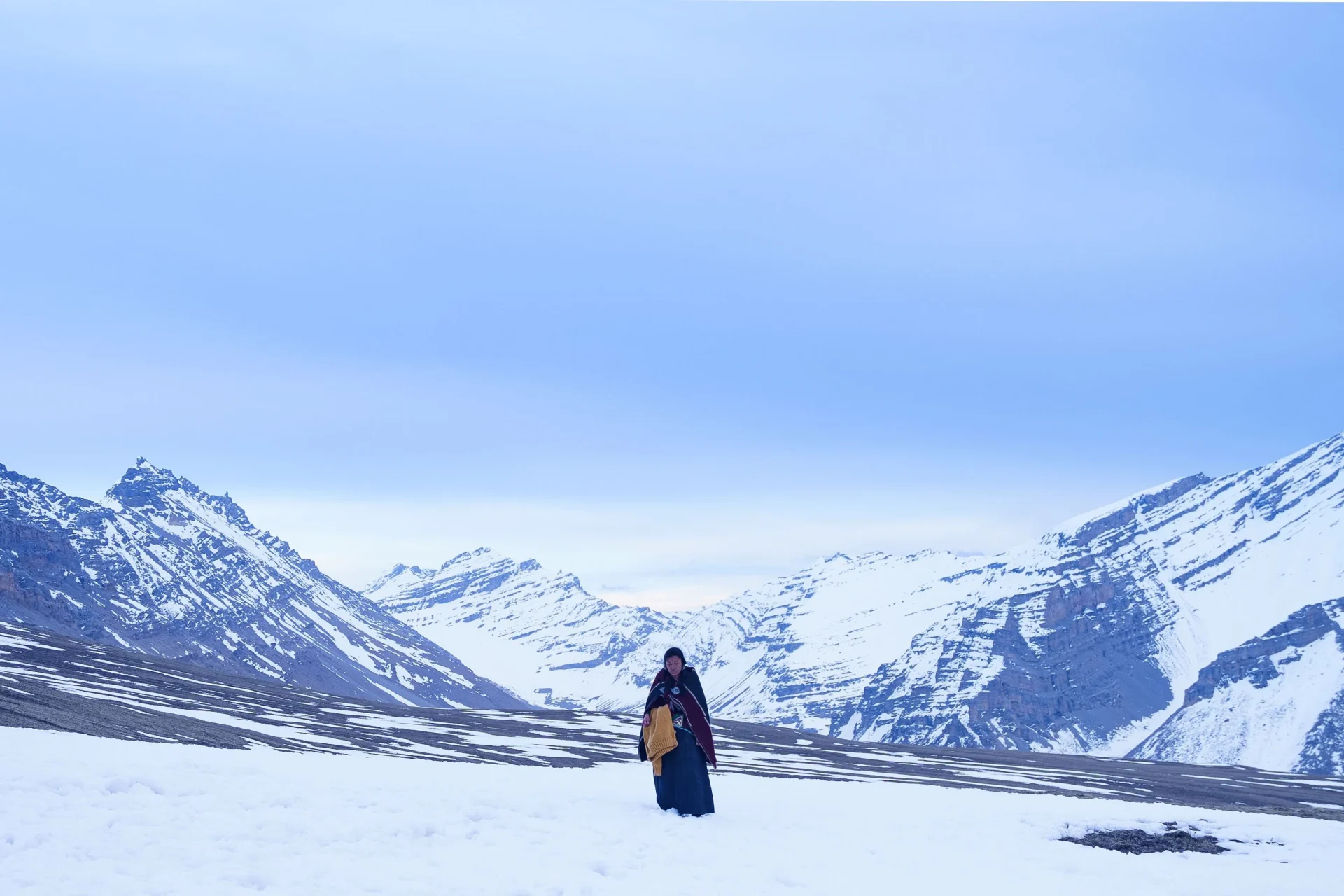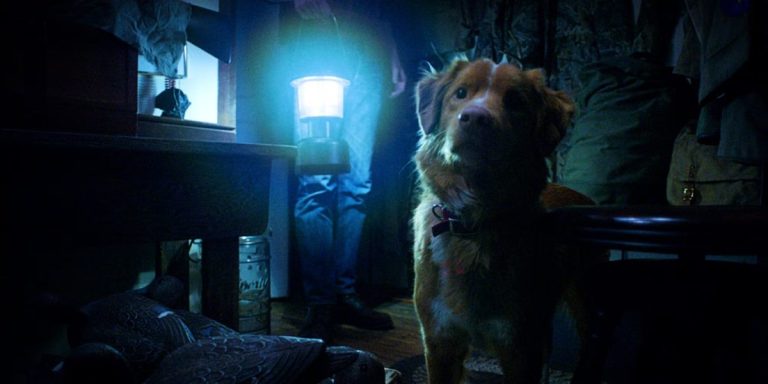Min Bahadur Bham’s sophomore feature, “Shambhala,” unfolds in the remote Nepalese Himalayan region. Opening in a village and the presence of community, the film and its remarkably self-assured heroine, Pema (Thinley Lhamo), shift away from those boundations in a quest for identity and freedom that’s not necessarily tied to markers of healthy, thriving family life. The film begins with Pema on the cusp of marriage to three brothers, in keeping with the polyandrous customs of the village. Her mother counsels her to be equally nice and generous to all three husbands, even though, of course, there would inevitably be one forging the closest intimacy.
That person is the eldest brother, Tashi (Tenzin Dalha). An instant connection sparks between Tashi and Pema. But signs of Tashi’s patriarchal prejudice are also noticeable; in a scene, he directs Pema to keep away from a woman who is said to have multiple lovers. Soon, Tashi has to leave for a trading excursion. Pema is left to look after Tashi’s youngest brother and husband, the eleven-year-old Dawa (Karma Wangyal Gurung), who just wants to play truant from school. Therefore, she fixes one of his school teachers, Ram (Karma Shakya), as his home tutor. Trouble starts brewing for Pema when she becomes pregnant, and local gossip insinuates that it might be Ram’s child that she’s carrying.
Pema is a quiet, non-combative person, but she doesn’t allow anyone to mistake her for being easily bullied into obeisance and doom by sour gossip. She never hints at being too upset or affected by the slurs against her. All she is disturbed by is that Tashi, who she was closest to, has chosen to doubt her. He opts not to return from his trading expedition and reunite with her after hearing the rumors. This deeply hurts Pema.
Thinley Lhamo is absolutely stunning. Abounding in a calm firmness, her performance doesn’t have the crutch of dramatically showy scenes, yet Lhamo achieves a certain unalloyed sense of being rooted in purpose and resolve. No one can make Pema budge from the course she embarks on. As she herself remarks later in the film, everyone has their own path and fate. She embraces her pursuit of finding and reaching out to Tashi so that she can tell her the truth in her own undiluted, untarnished words. Lhamo summons that stolidity deeply entrenched within Pema, but crucially, she is careful enough not to render the character too sealed off in her quiet certainties.
There’s a hardiness to the vision, arguably an implicit, staunch reiteration of the heroine’s own unshakable moral fiber. Pema is almost positioned in the narrative like a conduit of illumination, a touch surpassing the earthly. “Shambhala” is a film that is constantly alert and permeable to wonder and transcendence, strongly anchored as it is in the belief systems of the community Pema and her husbands belong to. The spiritual patina is ever so lightly yet keenly hewn into the mood and texture of the story.
The screenplay, which Bham co-wrote with Nepal’s other formidable filmmaker, Abinash Bikram Shah, tilts to the tersest of narrative action. The momentum is deliberately muted, the story possessing a temper that’s more passive than dynamic. But Bham is a deft storyteller, capable of not letting what would otherwise be alarmingly viewed as an intractable series of narrative troughs be a deterrent instead of a gentle, unusual propeller.

The screenplay pulls off a slew of bold decisions. Pema is obviously the redoubtable protagonist; however, the film refrains from diving into the minutiae of her emotional, inner life. She does project a steeliness resplendent in every shade of Lhamo’s performance without the screenplay making a hue and cry about her resilience and indomitable inner strength. In the opening scene of the film, Pema’s father marvels at her ability to effortlessly switch between doing the work of both men and women. She might have been nudged into a life of domestication; nonetheless, we are never made to question if her spirit gets dimmed by the responsibility of turning a house into a home.
“Shambhala” traces a woman’s journey of emerging from the folds of familial and marital duty into wresting agency on her terms. There’s also the tentative, tender, restfully blooming relationship between Pema and Karma (Sonam Topden), Tashi’s brother and effectively another of her husbands, that assumes center-stage in most of the second half. Karma starts out as one indifferent to worldly ties, having taken to a sequestered life in a monastery. He isn’t initially convinced at all about Pema’s ambition to set out for his brother. It takes the insistence of the monastery’s head and his guru, Rinpoche (Loten Namling), to accept the worldly call, which he has so adamantly been seeking to move away from.
The slow, sturdy growth of the bond between Pema and Karma and how the latter comes to warm up to the former make for a few of the film’s most sublime, emotionally transporting scenes. Music becomes a meeting point. Karma is reserved; she tells him cheekily that he compliments the sweater she’s weaving whenever he truly wishes to express something. Topden delicately registers Karma’s incipient unfastening of his heart and mind to what he earlier chafed at, gently guided by Pema.
The travail of women having to prove their purity and innocence is also underlined in some of the sights she passes by as a woman accused of adultery forced into death after she fails an archery challenge. The test of virtue is a constant burden among the women. The figuration of Pema, however, is filled with more positive potentiality than dire, her resistance and fierce sense of self warranting an emancipatory impulse.
Admittedly, the film’s pacing is extravagantly leisurely. But the slow unfurling that Bham favors in the film does work well in moving into effect a steady, sure sublimation of the senses. A frequency of long, unmoving takes accomplishes a deep-set quality. The director extracts understated, powerfully suggestive performances from everyone. Not a single face or presence, even if fleeting, strikes as having been consciously overwrought to perform in a tone just to fit into the languorous rhythms the scenes have.
DP Aziz Zhambakiyev has extraordinary expanses of the looming mountains and the craggy landscapes at his disposal. But the approach is more decisively spartan, mining the jaw-dropping vistas in widescreen compositions as a humbling tool instead of mere sweeping, still beauty. The sheer starkness of the climes Pema traverses is accentuated in the camerawork, while the film interweaves sepia-toned, dreamlike interludes that establish the mundane and ethereal being in constant play throughout. Mystical dashes infusing the narrative journey segue with the predominating routine, observatory style. Laden with fierce, feminist overtones, “Shambhala” is a film seeping with serene grace, sure and rich in its stillness.








